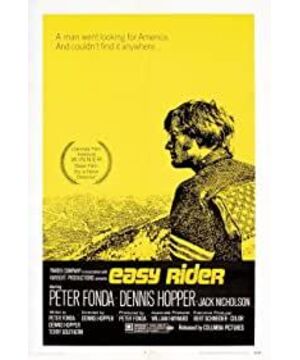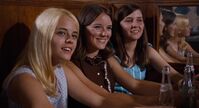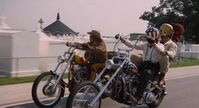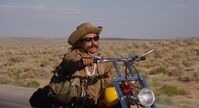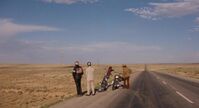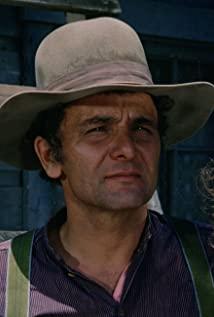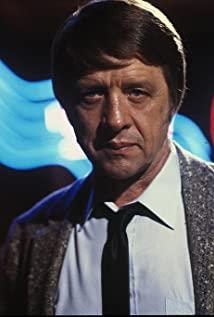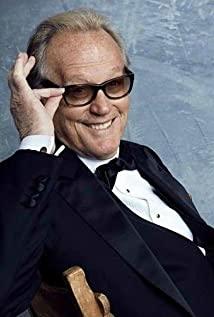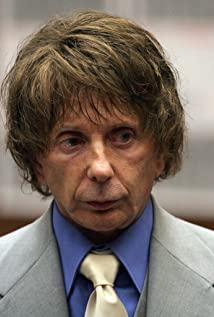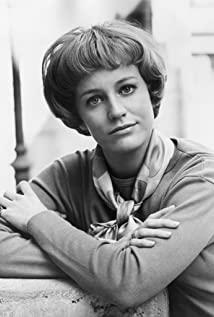Two young men took drug money and rode Harleys to the April Lent carnival in New Orleans. At night, the roadside hotel did not let them stay because of their appearance, but they let the strangers who reached out to the roadside take their ride. They chatted with the bearded man who was riding in the camping field because he had no land to live in the wild, and Billy asked the bearded: "Which city are you from?" When asked for the third time, he said: "I am from a The city." "Which city?" "Is there a difference? Every city is the same, the country is different, and that's where I'm going." White asked him again, "Who else would you like to be if you had the chance?" "I want to become a big fat pig." In fact, everyone is the same, whether they want to leave the city or become a pig, they are all escaping from this real society, escaping from the confusing and disappointing America in the 1960s. , escaping this mechanized industrial world. When they went all the way south to Texas, they happened to meet a local festival. They also participated in the parade of the symphony band. It was a celebration for them both. They enjoyed all this very much. The atmosphere of this celebration was not unhappy because of the slow rhythm of walking with the carriage, but represented their yearning for this primitive life. And then, unexpectedly, they were thrown into prison for the ridiculous reason of disrupting the road order. The government has this ability to shatter dreams. No matter how hysterical they shout and anger, they still hold on to the iron rod. They are inside and the police are outside. No matter how beautiful you think, the real world always disappoints you, cruel and cold as an iron fence. After meeting Hansen, the lawyer who rescued them, they went on the road together. When they arrived in a small town, they sat in a restaurant. Most of the people here were ordinary people. Strange, but when the girls at the next table turned to Hansen and the others to express their desire to ride their Harleys, the men started to change their minds. They started sarcasm among themselves, cursing these hippies, and later they even pointed at the nose, the decibels were getting higher and higher. The three of Hansen couldn't bear it and didn't return their mouths. They walked out of the restaurant and rode on a Harley. In the real society, they are "hippies" that ordinary people cannot understand, and they are the bastards of this society, a group of abandoned people. The "hippie movement" evolved from the beat generation, who gradually lost themselves in the boredom of life and the growing sense of social responsibility. They began to think independently and rebel in a true sense; to create their own Living Space They are just passively creating their own paradise. Under the idea of "love and peace", they use pure spirit to fight against the established values of society. Miss the simple and primitive gregarious life, and find the belonging of the soul in utopia. They are misunderstood by many and even deliberately vilified. They promote these youths as drug addicts, homosexuals, anti-progressive, "the scum of society". So they do everything possible to attack, vilify, and divide these young people who are seeking self-redemption. So much so that people with beards, sunglasses, long hair, leather jackets, and people with these characteristics will subconsciously resist when they see people with these characteristics, just like the petty citizens in this restaurant attacking them, what can Hansen and his party say? ? People who have been abandoned by the mainstream know that they have no right to speak, so they chose to leave without saying a word. Maybe they are so confused, and they are not accepted by the society, where will they go? In the evening, they asked Hansen, a self-disciplined lawyer, to smoke marijuana. Hansen couldn't resist the temptation and took the first sip. And when they were talking about life and existence, this country, he was so excited that he didn't even have time to smoke such a good marijuana, so he just wanted to say what he said about the world. When he realized that the marijuana was gone. White comforted him and saved it for the next day. But when they got up in the forest the next morning, they found that the local residents had beaten Hansen to death because they couldn't stand them. That cannabis represents Hansen, which represents rebellion, freedom, a tragic fate that will be spurned once the routine is broken, and a beautiful bubble that cannot be realized. When it is extinguished, it is never lit again, giving no hope at all. Drugs represent this generation, a hippie symbol, a countercultural phenomenon. For the generation at that time, drugs were not the contamination of spiritual substances that were criticized by others, but a means of venting their sufferings, and a spiritual comfort that could not be realized in the utopian world in their hearts. Drugs were a product of the times at the time. The journey didn't stop because of Hansen's death, and they made it to April Lent in New Orleans. The twisted abstract shot of the two of them in the cemetery with two prostitutes must have been impressive. Accompanied by harsh industrial punk and the voice of a girl praying for atonement, there is an air of religious ritual, more of a pagan transcendence. The sacred and the filthy are inextricably intertwined, the joy and the pain are indistinguishable, and the living is like a set of subjective lenses from hell. The constant murmuring of the woman represents the depravity of man, and the sound of construction on the construction site implies the connection between the depravity of man and the highly developed capitalism, just like the wild dog who died tragically beside the industrial machine in the cemetery. The construction sound expounded the original sin that appeared in the girl's whisper. The once paradise ceased to exist because of the sins of the people. Only Only by escaping from the industrialized state of life can we look back at the essence of life. It is not difficult to see that this is a religious implication of asking for self-salvation when White knelt down on the statue of the Virgin Mary. They lost themselves in reality and could not find where their hearts belonged, leading to the collapse of their beliefs. They can only fall in this hellish world and atone for the sins that all of them committed together. The audience was entangled in this nightmarish mood and was on the verge of collapse, and finally felt this fateful and powerful despair. After a series of factory shots, the machines are finally back on the road, and we can breathe a sigh of relief to finally leave this hellish no-man's land. Back on the road and it's the end of the day, they're on the road and they're absurdly shot by two peasants who can't stand it. The dream of freedom is shattered with a single blow. They hit the road on a Harley, only to end up on a Harley. Harley, the most typical product of American industrialization, is the biggest irony of the film. And this kind of ending is not a kind of relief for them, but they don't know where to go when they start again. Like Billy and White, the tire that flew up due to the explosion also represented the erratic, confused, and panicked mental state of this generation.
Why didn't they show their yearning and conception of the utopian world in the movie? They followed the big beard to the autistic primitive community in the countryside, so they stopped there and did not want to leave. The people there plant seeds by themselves, build houses by themselves, love as much as they want, and even have their own troupe. Isn't this kind of living state what they have been striving for? They recited in prayer before meals: "We have sown, we have asked, and our efforts are worth it, to make simple food, to satisfy our simple appetite. When it is our own, we share the food with our fellows, becoming Be more generous. Thank you for your full support." At least they still had faith, the faith that Billy and White had broken down to make sure that God was dead. This self-sufficiency, poverty, hunger and freedom of bohemian life intoxicated them. Bohemianism refers to a way of life that can live and work cheaply without following traditions and achieve spiritual freedom. This is similar to the utopian world they imagined. When they parted, they were very kind, but they went to the pond with a group of women to play and cheer, which not only reflected the open consciousness and uninhibited nature of that generation, but also represented freedom. pond. The two conversations they had with Hansen directly reflected their conception of utopia and their troubles limited by reality. When talking about aliens, Hansen said, "They are people like us, they don't have to cry 'no war' they don't have money society, they don't have leaders, everyone is a leader, equal and don't have to work hard, they can support themselves. Now we There are still leaders who have decided to suppress news so as not to cause panic, especially in our old system. Now that the Venusians are connecting all walking beings, humanity will have God-like powers to transcend its destiny and achieve equality.” This Duanhua fully reflects the Datong society and desire in his mind, and also directly or indirectly judges the real society and corrupt government. They believe that the United States is a world full of conventions and stereotypes. It has become the sum total of stereotypes that suppress human individuality and persecute individual free life. The only way to escape from this society and get rid of all kinds of connections with real society and real cultural patterns, to save the individual and American society from walking into a dead end. Martin Luther King Jr. delivered a speech, Kennedy was assassinated, the Vietnam War, man landed on the moon, and Khrushchev threatened to destroy the United States. That era was destined to be a complex, profound, serious, and confusing era. The great abundance of material life and the constant emergence of life problems make them start to think about how to escape this stifling and materialistic mainstream society. Hansen also expressed a Duan his appeal: "This country used to be a good country, I don't understand what went wrong." "Everyone has chickens, that's all, we can't even get into a second-rate hotel, they're afraid we'll put them Cut your throat." "They're not afraid of you, it's what you stand for" "We're all about hairstyles that everyone needs and personality." "No, you stand for freedom...talking about it versus achieving it is Two different things, true freedom is hard to come by, especially when you're put on the market. So don't tell people you're free, they'll prove you wrong by killing and doing evil." The next morning, He was beaten to death by the local residents for disliking him. He combines his demands for social justice with personal truths, who know what they stand for, but are clear about its falsehood. Mainstream people are afraid of these young people, they are afraid of the awakening of their self-awareness, they are afraid of their resistance to tradition, they are afraid that they can do what they want to do but are afraid to do, and they are afraid of their subversion of the mainstream, so they exclude these young people. . In this materialistic society, only when you are put on the market can you reflect your value, and when you are put on the market, you have lost the freedom and belief you seek. This is an alienated society. People who have freedom are despised, beaten, and maybe ruled by money to make them enjoy? Finally they arrive at the April Lent Carnival in New Orleans, where they go out on the streets with two prostitutes. They played unbridled, kissed, cheered, and merged into the sea of joy, as if the whole world was singing. This embodies Bakhtin's carnival theory. There are two more worlds in the carnival theory, one is the official, serious, and hierarchical world of order. The second is the carnival world that is separated from the system in the style of carnival square, which is the "temporary road leading to a utopian world". April fasting is like a "temporary road to a utopian world", temporarily satisfying their romantic vision, and it is also the last time the film makes them wandering on the edge of a utopian world. This is temporary after all, leaving the bustling streets, they return to the "first world". They didn't know where to go between the "first world" and the "second world", and finally chose to liberate themselves. Two different things, true freedom is hard to come by, especially when you're put on the market to buy and sell. So don't tell people you are free, they will prove you wrong by killing and doing evil. "The next morning, he was beaten to death by the local residents for disliking him. He combined his demands for social justice with personal truths, who knew what he was representing, but who was clear. Be aware of its illusion. The mainstream people are afraid of these young people, afraid of the awakening of their self-awareness, afraid of their resistance to tradition, afraid that they can do what they want but dare not do, afraid of their subversion of the mainstream , so they crowd out these young people. In this materialistic society, your value can only be reflected when you are put on the market, and at the moment when you are put on the market, you have lost the freedom and belief you seek. It's an alienated society where people who have freedom are despised, beaten, maybe ruled by money for their enjoyment? Finally they arrive at the April Lent carnival in New Orleans, where they go to the streets with two prostitutes They played unbridled, kissed, cheered, and merged into the sea of joy, as if the whole world was singing. This reflected Bakhtin's carnival theory. There are two worlds in carnival theory, one is official, A serious, hierarchical world of order. The second is a carnival square-style carnival world that is separated from the system, which is a "temporary road to a utopian world." April Lent is like a "temporary road to a utopia." Satisfying their romantic vision is also the last time the film makes them linger on the edge of the utopian world. This is temporary after all, leaving the bustling streets, they return to the "first world". They are in the "first world" and The "Second World" did not know where to go, and finally chose to liberate himself. Two different things, true freedom is hard to come by, especially when you're put on the market to buy and sell. So don't tell people you are free, they will prove you wrong by killing and doing evil. "The next morning, he was beaten to death by the local residents for disliking him. He combined his demands for social justice with personal truths, who knew what he was representing, but who was clear. Be aware of its illusion. The mainstream people are afraid of these young people, afraid of the awakening of their self-awareness, afraid of their resistance to tradition, afraid that they can do what they want but dare not do, afraid of their subversion of the mainstream , so they crowd out these young people. In this materialistic society, your value can only be reflected when you are put on the market, and at the moment when you are put on the market, you have lost the freedom and belief you seek. It's an alienated society where people who have freedom are despised, beaten, maybe ruled by money for their enjoyment? Finally they arrive at the April Lent carnival in New Orleans, where they go to the streets with two prostitutes They played unbridled, kissed, cheered, and merged into the sea of joy, as if the whole world was singing. This reflected Bakhtin's carnival theory. There are two worlds in carnival theory, one is official, A serious, hierarchical world of order. The second is a carnival square-style carnival world that is separated from the system, which is a "temporary road to a utopian world." April Lent is like a "temporary road to a utopia." Satisfying their romantic vision is also the last time the film makes them linger on the edge of the utopian world. This is temporary after all, leaving the bustling streets, they return to the "first world". They are in the "first world" and The "Second World" did not know where to go, and finally chose to liberate himself. freedom and belief. This is an alienated society. People who have freedom are despised, beaten, and maybe ruled by money to make them enjoy? Finally they arrive at the April Lent Carnival in New Orleans, where they go out on the streets with two prostitutes. They played unbridled, kissed, cheered, and merged into the sea of joy, as if the whole world was singing. This embodies Bakhtin's carnival theory. There are two more worlds in the carnival theory, one is the official, serious, and hierarchical world of order. The second is the carnival world that is separated from the system in the style of carnival square, which is the "temporary road leading to a utopian world". April fasting is like a "temporary road to a utopian world", temporarily satisfying their romantic vision, and it is also the last time the film makes them wandering on the edge of a utopian world. This is temporary after all, leaving the bustling streets, they return to the "first world". They didn't know where to go between the "first world" and the "second world", and finally chose to liberate themselves. freedom and belief. This is an alienated society. People who have freedom are despised, beaten, and maybe ruled by money to make them enjoy? Finally they arrive at the April Lent Carnival in New Orleans, where they go out on the streets with two prostitutes. They played unbridled, kissed, cheered, and merged into the sea of joy, as if the whole world was singing. This embodies Bakhtin's carnival theory. There are two more worlds in the carnival theory, one is the official, serious, and hierarchical world of order. The second is the carnival world that is separated from the system in the style of carnival square, which is the "temporary road leading to a utopian world". April fasting is like a "temporary road to a utopian world", temporarily satisfying their romantic vision, and it is also the last time the film makes them wandering on the edge of a utopian world. This is temporary after all, leaving the bustling streets, they return to the "first world". They didn't know where to go between the "first world" and the "second world", and finally chose to liberate themselves.
White in the film doesn't like to talk. He was often silent or smiling while others discussed the hottest topics. At the beginning of the film, when dealing with drug dealers, a plane almost flew past them. The drug dealer was so frightened that he ran away. Here is a hint of his uninhibited and adventurous spirit. "What do you want to be?" "I want to be a big fat pig." "I just want to be myself." He is an "atypical" hippie when chatting with the bearded homeless man. He is not afraid or escaping from reality, but just to pursue what he aspires to, and he embarks on the road by constantly exploring and excavating himself. So when he arrived at that primitive bohemian community, she refused to leave for a long time, which was the living state he was looking for. But he had to hit the road. He did it to change, not to live on his own in such a beautiful place. The locals persuaded him, "You know, this might be the right place. You're out of time." Then Billy called to him, "Hey! If we're going, let's go!" He hesitated for a while, but still got up. He still didn't have the courage to settle down and have a belief that was enough to change. When they arrive in New Orleans, Billy finds two prostitutes for him and himself, but White doesn't care and proposes to take two prostitutes to Mardi Gras. It more directly shows that their generation is not addicted to drugs, promiscuity, rock, but a state of mind that these things represent. We see him crawling onto the head of the Virgin, crying and begging forgiveness, as we get in the way of the ambiguous, dream-like despair in the cemetery. People who have been calm and silent all the time finally collapsed in the face of self-salvation, went mad, lost control, fell into the abyss, and fell into the bottomless hell. After going through this journey, he finally understood that a true utopia cannot exist. If I had known this was the end, why not stay in that primitive community? Back on the Harley, he took off his star-striped hat and jacket. "I had a mother, and I hated him so much." It was more of a political appeal. When he first hit the road, he was dressed in the stars and stripes, and Harley was also painted with stars and stripes. In the Great West, which represents the heroic dream of many American cowboys, "God bless America" can be seen everywhere on the road, and he also carried an "American dream". But as the journey went further and further away, he discovered that God had already left Americans to fend for themselves. Coupled with a series of historical events at that time, he lost his confidence in the United States and began to be pessimistic and confused. Billy took the money and said, "We're rich! We're rich! We're free!" Billy whispered, "We screwed up." Yes, we screwed up.
Music played an integral role in "Beat Generation," and even more so in this film. Hippie music is an evolution of life. From the relaxed and happy at first, the bright tones like country music ballads, to the increasingly depressing, long rap, dead gothic rock, venting their accusations against society, their incomprehension about life and their hysterical pursuit . Music is like the protagonist's mental journey, free and easy, and broken with one blow.
The ending song sings like this: "Let's flow/Let's flow/Big river/Take me away/All she wants is freedom/That's how this road should be/Let's flow/Let's flow/Big river/Take me away/Go to another place /Flowing to the sea" Maybe for the protagonist in the film, instead of struggling between the hellish reality and the utopian world that he knows and pursues, he doesn't know where to go. Instead of going to the sea, he will go to the real freedom.
View more about Easy Rider reviews


